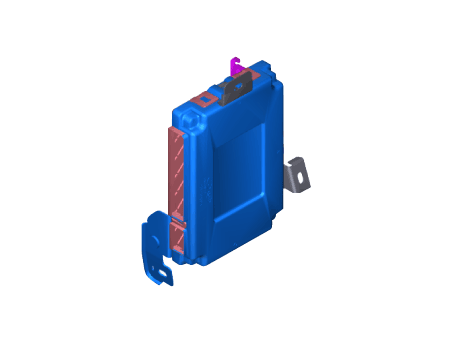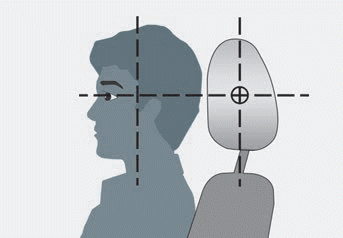Hyundai Venue: Tire Pressure Monitoring System / TPMS Receiver. Description and operation
TPMS Receiver : Integrated Body Control Unit (IBU) integrated management

| 1. |
Mode
| (1) |
Virgin State
| •
|
The receiver as a sole part is shipped in this state.
Replacement parts should therefore arrive in this state.
|
| •
|
In this state, there is no Auto-Location, no sensor
wake-up, no sensor monitoring and no DTC monitoring..
|
| •
|
The state indicates that platform specific parameters
must be written to the receiver and that sensors are
un-learned.
|
|
| (2) |
Normal State
| •
|
In order for tire inflation state and DTC monitoring
to occur, the receiver must be in this state.
|
| •
|
In this state, automatic sensor location / learning
is enabled.
|
|
|
| 2. |
Overview
| • |
Learn TPMS sensor for under inflation monitoring automatically.
|
| • |
Uses sensor information, distance travelled, background noise
levels, Auto-learn status, short / open circuit output status,
vehicle battery level, internal receiver states to determine
if there is a system or a vehicle fault.
|
|
| 1. |
General Function
| • |
Auto-learn takes place only once per Ignition cycle.
|
| • |
On successful completion, 4 road wheel sensor ID's are latched
into memory for monitoring.
|
| • |
Until Auto-learn completes, previously learned sensors are monitored
for under inflation / leak warnings.
|
|
| 2. |
General Conditions to Learn New Sensors:
| • |
Receiver must determine that it is confident that sensor is
not temporary:
a. Uses vehicle speed.
b. Uses confidence reduction of previously learned sensors.
|
| • |
Typical time at driving continuously over 15.5 mph(25 kph) to
learn a new sensor is up to 20 minutes.
|
|
| 3. |
General Conditions to Un-Learn a sensor that is removed :
| • |
It takes less than 20 minutes at 15.5 mph(20-30 kph).
|
| • |
Confidence reduction is dependent on time which vehicle is driven
at speed greater than or equal to 12.4 mph(20-30 kph).
|
|
Replacement
1.
Remove the wheel and tire.
2.
Remove the valve core and deflate the tire.
3...
Replacement
[TPMS Receiver (Integrated Body Control Unit (IBU))]
1.
Turn the ignition switch OFF and disconnect the battery negative (-)
cable...
Categories
The vehicle’s front and rear seats have adjustable head restraints. The head
restraints provide comfort for passengers, but more importantly they are designed
to help protect passengers from whiplash and other neck and spinal injuries during
an accident, especially in a rear impact collision.
WARNING
To reduce the risk of serious injury or death in an accident, take the following
precautions when adjusting your head restraints:
Always properly adjust the head restraints for all passengers BEFORE
starting the vehicle.
NEVER let anyone ride in a seat with the head restraints removed or reversed.

read more

 TPMS Sensor. Repair procedures
TPMS Sensor. Repair procedures TPMS Receiver. Repair procedures
TPMS Receiver. Repair procedures
